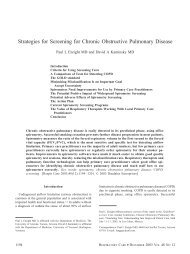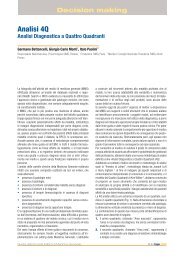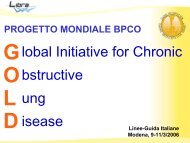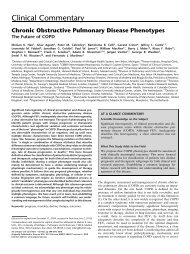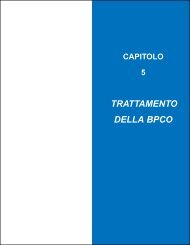Individual behavioural counselling for smoking cessation ... - GOLD
Individual behavioural counselling for smoking cessation ... - GOLD
Individual behavioural counselling for smoking cessation ... - GOLD
You also want an ePaper? Increase the reach of your titles
YUMPU automatically turns print PDFs into web optimized ePapers that Google loves.
B A C K G R O U N D<br />
Psychological interventions to aid <strong>smoking</strong> <strong>cessation</strong> include selfhelp<br />
materials, brief therapist-delivered interventions such as advice<br />
from a physician or nurse, intensive <strong>counselling</strong> delivered on<br />
an individual basis or in a group, and combinations of these approaches.<br />
Previous reviews have shown a small, but consistent, effect<br />
of brief, therapist-delivered interventions (Silagy 2004). The<br />
effect of self-help interventions is less (Lancaster 2002a). More<br />
intensive intervention in a group setting increases quit rates (Stead<br />
2005).<br />
In this review, we assess the effectiveness of more intensive <strong>counselling</strong><br />
delivered by a <strong>smoking</strong> <strong>cessation</strong> counsellor to a patient on<br />
a one-to-one basis. One problem in assessing the value of individual<br />
<strong>counselling</strong> is that of confounding with other interventions.<br />
For example, <strong>counselling</strong> delivered by a physician in the context<br />
of a clinical encounter may have different effects from that provided<br />
by a non-clinical counsellor. One approach to this problem<br />
is to employ statistical modelling (logistic regression) to control <strong>for</strong><br />
possible confounders, an approach used by the US Public Health<br />
Service in preparing clinical practice guidelines (AHCPR 1996;<br />
AHRQ 2000). An alternative approach is to review only unconfounded<br />
interventions. This is the approach we have adopted in<br />
the Cochrane Tobacco Addiction Review Group. In this review,<br />
we there<strong>for</strong>e specifically exclude <strong>counselling</strong> provided by doctors<br />
or nurses during the routine clinical care of the patient, and focus<br />
on <strong>smoking</strong> <strong>cessation</strong> <strong>counselling</strong> delivered by specialist counsellors.<br />
We define <strong>counselling</strong> broadly, based only on a minimum<br />
time spent in contact with the smoker, not according to the use<br />
of any specific <strong>behavioural</strong> approach.<br />
O B J E C T I V E S<br />
The review addresses the following hypotheses:<br />
1. <strong>Individual</strong> <strong>counselling</strong> is more effective than no treatment or<br />
brief advice in promoting <strong>smoking</strong> <strong>cessation</strong>.<br />
2. <strong>Individual</strong> <strong>counselling</strong> is more effective than self-help materials<br />
in promoting <strong>smoking</strong> <strong>cessation</strong>.<br />
3. A more intensive <strong>counselling</strong> intervention is more effective than<br />
a less intensive intervention.<br />
Studies comparing different <strong>counselling</strong> approaches are also included<br />
here if they are not covered by other Cochrane reviews<br />
of specific interventions. Comparisons between individual <strong>counselling</strong><br />
and <strong>behavioural</strong> therapy conducted in groups are now covered<br />
in the Cochrane review of group <strong>behavioural</strong> therapy (Stead<br />
2005)<br />
C R I T E R I A F O R C O N S I D E R I N G<br />
S T U D I E S F O R T H I S R E V I E W<br />
Types of studies<br />
Randomized or quasi-randomized controlled trials with a minimum<br />
follow up of six months, where at least one treatment arm<br />
consisted of an unconfounded intervention from a counsellor.<br />
Types of participants<br />
Any smokers, except pregnant women. (Smoking <strong>cessation</strong> interventions<br />
in pregnancy are addressed by a separate review, Lumley<br />
2004). Trials recruiting only children and adolescents are also excluded.<br />
Types of intervention<br />
We defined individual <strong>counselling</strong> as a face-to-face encounter between<br />
a <strong>smoking</strong> patient and a counsellor trained in assisting <strong>smoking</strong><br />
<strong>cessation</strong>. This review specifically excludes studies of <strong>counselling</strong><br />
delivered by doctors and nurses as part of clinical care,<br />
which are covered in separate reviews (Rice 2004; Silagy 2004). It<br />
also excludes interventions which address multiple risk factors in<br />
addition to <strong>smoking</strong>.<br />
Types of outcome measures<br />
We used sustained abstinence, or multiple point prevalence, where<br />
available. We included studies using self report with or without<br />
biochemically validated <strong>cessation</strong>, and per<strong>for</strong>med sensitivity analyses<br />
to determine whether the estimates differed significantly in<br />
studies without verification.<br />
S E A R C H M E T H O D S F O R<br />
I D E N T I F I C A T I O N O F S T U D I E S<br />
See: Cochrane Tobacco Addiction Group methods used in<br />
reviews.<br />
We searched the Tobacco Addiction Group Specialized Register<br />
<strong>for</strong> studies with counsel* in title, abstract or keyword fields. We<br />
also checked previous reviews and meta-analyses <strong>for</strong> relevant<br />
studies, including all studies in the US guidelines (AHCPR 1996;<br />
AHRQ 2000). Date of most recent search December 2004.<br />
M E T H O D S<br />
O F T H E R E V I E W<br />
Both authors extracted data. The principal outcome was<br />
<strong>cessation</strong> rates. The in<strong>for</strong>mation extracted included descriptive<br />
in<strong>for</strong>mation (the population and intervention studied), method<br />
of randomization and allocation concealment, completeness of<br />
follow up, and whether self-reported <strong>cessation</strong> was validated.<br />
Participants lost to follow up were assumed to be continuing<br />
smokers.<br />
<strong>Individual</strong> <strong>behavioural</strong> <strong>counselling</strong> <strong>for</strong> <strong>smoking</strong> <strong>cessation</strong> (Review)<br />
Copyright © 2007 The Cochrane Collaboration. Published by John Wiley & Sons, Ltd<br />
2


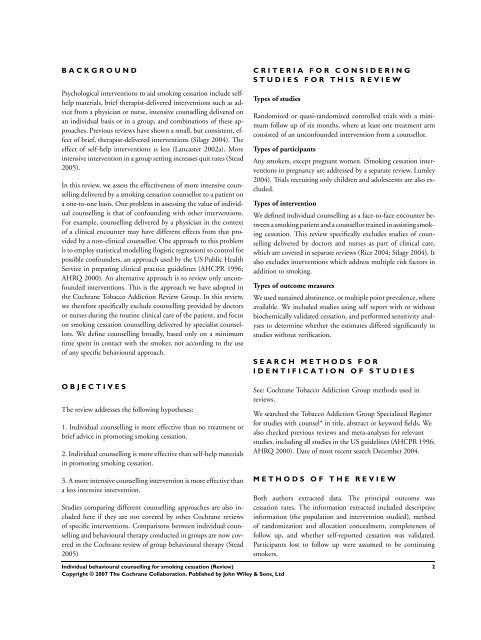


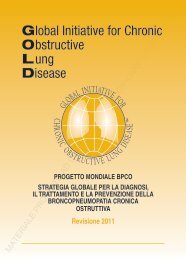
![Di Bari [NO].pdf - GOLD](https://img.yumpu.com/21544924/1/190x143/di-bari-nopdf-gold.jpg?quality=85)


